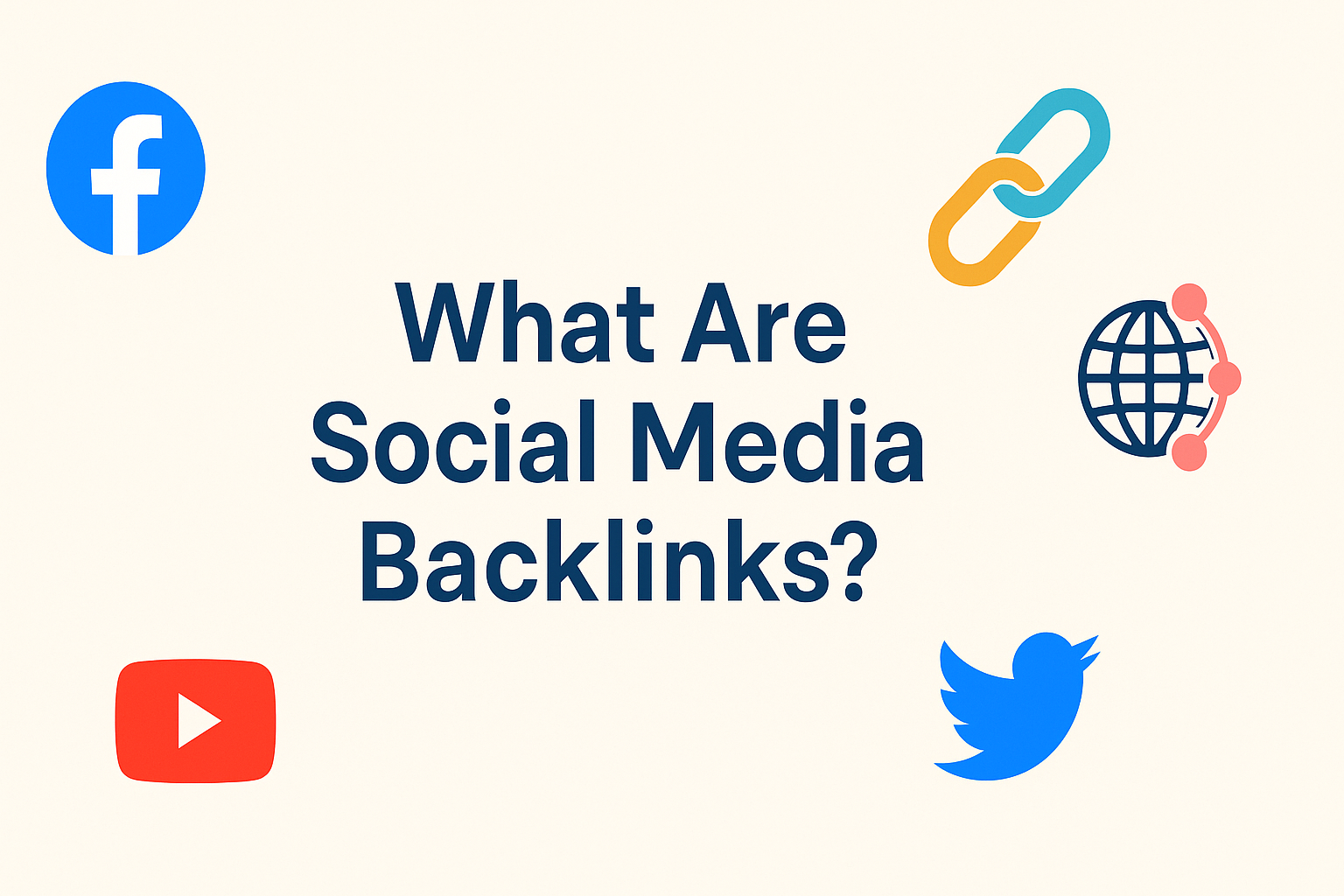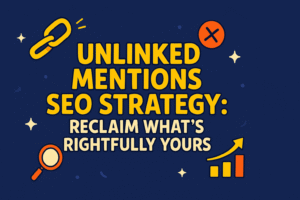
If you want your website to show up higher in Google searches, backlinks are your best friends. But did you know backlinks from social media can help you rank better, too? Today we are diving deep into the world of social media backlinks and how they can give your website a real SEO boost.
Most people talk about backlinks from other websites or blogs. They say those backlinks matter the most. They are partly right. But social media backlinks are also a powerful tool. They do not always directly boost your SEO ranking in the way traditional backlinks do, but they still drive traffic, increase visibility, and ultimately help your site perform better.
In this blog, we will look at exactly what social media backlinks are, how they can help your SEO, and how you can start building them effectively.
Let us get started!
What Are Social Media Backlinks?

First things first, we need to understand clearly what social media backlinks are.
Social media backlinks are simply links from social media platforms like Facebook, Twitter, LinkedIn, Pinterest, Instagram, or YouTube that point back to your website or blog. Whenever someone shares your website link on their social media profile, page, or group, that creates a backlink.
These backlinks might not always directly affect your Google rankings the way a backlink from a popular news website does. But these social backlinks still matter—often more than people think.
Why Do Social Media Backlinks Matter?
You might be thinking: “Google says social media links do not directly affect rankings, so why bother?”
Here is why you should care:
1. Increased Traffic
Social media backlinks can send real, human visitors to your site. If people click your link, it signals your content is useful and relevant.
2. Brand Visibility
Each share on social media boosts your content visibility. The more people see you, the higher the chance someone else will link back to your site from a blog or a website.
3. Content Indexing
Sharing content on platforms like Twitter or LinkedIn helps Google find and index your pages faster. It gives Google the signal your content exists.
4. Boosted Authority
While social media links might not be a direct ranking factor, social engagement and popularity can indirectly improve how your content is viewed by Google.
Social media backlinks do not just drive immediate traffic—they create opportunities for your content to become popular and earn more traditional backlinks down the line.
Best Social Media Platforms for Backlinks
Not all social media backlinks are created equal. Here are the best platforms to get valuable backlinks from:
- Largest social platform.
- Excellent for traffic and engagement.
- Posts can easily go viral.
- Perfect for professional content.
- High trust level—Google respects it.
- Good for B2B links.
Twitter (X)
- Fast indexing of links.
- High potential for retweets and shares.
- Easy to build backlinks rapidly.
- Great for visually appealing content.
- Pins have a long lifespan.
- Good source of steady traffic.
YouTube
- Videos rank high on Google.
- Backlinks in descriptions are valuable.
- Excellent for tutorials and guides.
How to Build Social Media Backlinks That Help SEO
Here are some simple yet effective tips for creating social media backlinks that actually bring SEO results.
Create Share-Worthy Content
Your content must be worth sharing. Think about:
- How-to guides.
- Infographics.
- Engaging videos.
- Useful lists.
Good content spreads fast on social media, generating more backlinks naturally.
Optimize Social Profiles
Make sure your social media profiles clearly link back to your website. Every social profile you own should contain a clear link to your homepage or a key landing page.
Use Images and Videos
Visual content grabs attention. Platforms like Pinterest and Instagram heavily rely on visuals, making them great for backlinks. Use visually appealing content to encourage shares.
Engage With Influencers
Influencers have thousands or millions of followers. If an influencer shares your content, it can quickly generate a ton of backlinks and traffic.
- Follow influencers.
- Comment regularly.
- Ask them politely to share your content.
Leverage Groups and Communities
Facebook and LinkedIn groups offer great opportunities. Do not spam—add value. Share helpful content regularly. Over time, you will earn respect and naturally build backlinks.
Run Social Media Contests
Contests encourage shares and backlinks. People love free stuff. Running contests or giveaways can increase your backlinks significantly in a short period.
How to Track Your Social Media Backlinks
Tracking your social media backlinks helps you know which platforms and content drive the best results. Here are some easy-to-use tools:
- Google Analytics:
- Provides detailed reports on where your website visitors originate.
- Shows referral traffic specifically from social media platforms.
- Bitly:
- Allows you to shorten links for easy sharing.
- Offers click-tracking to measure engagement on each social media platform.
- Hootsuite:
- Monitor your social media activity from a central dashboard.
- Tracks backlinks, mentions, and interactions in real-time.
- Buffer:
- Helps schedule and analyze content performance.
- Gives insights into shares, engagement, and reach on social media.
Regular backlink tracking lets you:
- Understand which social media networks drive the most traffic.
- Identify which content types resonate with your audience.
- Improve your social media strategy for higher engagement and conversions.
Common Mistakes to Avoid With Social Media Backlinks
Social media backlinks are easy, but you can still make mistakes. Here is what to avoid:
1. Spamming Groups
Never spam groups or communities. Always add value. If you spam, you lose trust, and people stop clicking your links.
2. Ignoring Profile Links
Do not forget your profile links. Profiles often rank high in search engines. Make sure your social profiles always include clear backlinks to your website.
3. Using Too Many Platforms
It is better to do a few platforms well than many poorly. Focus on a few platforms that match your audience and industry best.
Real Examples of Social Media Backlinks Working
Let us look at a few real-life examples of brands that use social media backlinks smartly:
Starbucks
Starbucks regularly shares engaging photos and links to their website, driving huge amounts of traffic and brand exposure.
Nike
Nike uses video content and athlete endorsements to generate shares and backlinks naturally. Their content quickly spreads across social media, generating even more backlinks.
HubSpot
HubSpot shares educational content on LinkedIn, Facebook, and Twitter. They regularly get backlinks because their content is highly valuable and share-worthy.
Advanced Tips for Social Media Backlinks
Want more? Here are some advanced tips:
- Leverage Live Videos:
Go live on platforms such as Instagram and Facebook. Live streams generate high engagement, making them perfect for sharing links and prompting instant actions from viewers. - Brand Collaborations:
Partner with influencers or complementary brands. Joint campaigns or shared content increase your visibility, expanding your audience and multiplying backlink opportunities. - Instagram Stories and Highlights:
Use Stories to share timely content, limited offers, or promotions. By adding swipe-up or clickable links, you can direct immediate traffic to your website or landing pages. - Optimize Your Profiles:
Regularly update your social media bios and profiles with direct, relevant links to specific pages on your site, ensuring consistent backlink traffic.
These techniques help enhance your social media presence while driving valuable SEO backlinks.
Social Media Backlinks Checklist
Follow this quick checklist each time you create new content to effectively leverage social media backlinks:
- Produce Quality Content:
Always start with high-quality, valuable content. Content that is engaging, informative, and original naturally attracts backlinks. - Optimize Social Profiles:
Ensure your social media profiles clearly represent your brand. Include your website link prominently to encourage visitors to explore more content. - Share Across Platforms:
Post your content consistently across multiple social channels such as Facebook, Twitter, LinkedIn, Instagram, and Pinterest. Tailor each post to match the platform’s audience and style. - Engage Influencers:
Regularly connect and build relationships with influencers in your industry. Influencers sharing your content significantly boosts visibility and generates authoritative backlinks. - Monitor Results:
Use analytics tools to track how your social media efforts are performing. Identify which platforms deliver the best backlinks and engagement, and refine your approach accordingly. - Avoid Spammy Practices:
Steer clear of automated, unnatural, or spammy methods. Genuine, organic backlinks earned through real engagement always deliver superior SEO results.
Final Thoughts: Start Small, Grow Big
Social media backlinks may not directly affect SEO rankings immediately, but they help in building traffic, brand recognition, and indirectly boosting traditional backlinks.
- Start with creating shareable content.
- Pick the right platforms for your audience.
- Consistently engage with your community.
Over time, your social media backlinks will not only drive more visitors but also improve your overall website visibility, authority, and rankings.
Social media backlinks matter more than you might have thought. Now you have everything you need to start building them and driving real, meaningful SEO results.
Happy linking!
FAQs
Q1: Do social media backlinks directly impact SEO?
Ans. Not directly. But they increase traffic and exposure, which indirectly helps SEO.
Q2: What social media platform is best for backlinks?
Ans. Facebook, LinkedIn, Twitter, Pinterest, and YouTube all work well.
Q3: Can too many social media backlinks hurt my SEO?
Ans. No. Social media backlinks are usually safe. Just avoid spamming.
Q4: How do I track backlinks from social media?
Ans. Use Google Analytics, Bitly, Buffer, or Hootsuite.
Q5: Are profile links important?
Ans. Yes. Profile links are important and often rank high in search engines.


